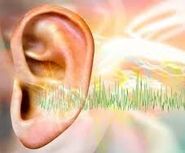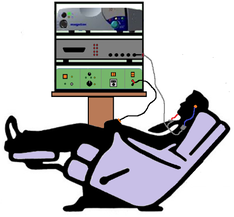 Getty image
Getty image 
 Getty image
Getty image 
http://soniclab.umn.edu/research/enhanced-hearing-aid-humans-tinnitus-treatment-and-other-auditory-applications
 Getty image Getty image Tinnitus comes from the Latin word tinnire, meaning to ring, and is commonly defined as ringing in the ear. The sound tinnitus sufferers hear though is quite variable, and it can be perceived as ringing or clicking, hissing, chirping, or buzzing, which may be high or low pitch and vary in volume and persistence. It may also be present in one ear only or in both but with different intensities. Approximately 20% of the US population is estimated to suffer from tinnitus. Many people have experienced temporary tinnitus after exposure to loud noises (firecrackers or other explosions, concerts); I focus here only on chronic tinnitus. Often tinnitus develops as a consequence of aging-associated hearing loss or exposure to loud noise, resulting in inner ear hair cell damage. These tiny hairs in the cochlea normally move in response to sound waves, initiating an electrical signaling process via the auditory nerve to the brain, where the latter interprets the signal as sound. It is the lack of this signal that makes the brain compensate for it and create the “phantom” sound resulting in tinnitus. Although the mechanism behind tinnitus has not been completely elucidated yet, some scientists believe that the brain is trying to fill in the blanks of the sounds we can no longer hear when we lose sensory hair cells. In some other cases there is a specific cause for tinnitus, which may then be identified and possibly treated. For example, tinnitus can occur when there is a accumulation of ear wax (so it gets better upon wax removal) or can also be a side effect of medications (in which case it may go away or get better once the person stops taking the meds); these include some antibiotics (erythromycin, vancomycin, neomycin), cancer medications (methotrexate, cisplatin), diuretics, quinine-containing antimalarials, some antidepressants, high-dose aspirin, anti-inflammatories, and some herbal supplements as well as nicotine and caffeine. Meiniere’s disease is characterized by symptoms such as vertigo and tinnitus; head, neck or jawbone problems or high blood pressure may also cause tinnitus.  The most common type of tinnitus, however, is one that does not have a trigger that can be removed, is constant and increases gradually in volume with time. Although present sometimes in young people, it is more common in older individuals (associated with hearing loss) and in those who have been exposed to loud noise that damages the cochlea hair cells. Working in loud factories, the music industry (as Bradley Cooper’s character rocker in “A Star Is Born”), construction, or using firearms can lead to or worsen tinnitus. Some contemporary celebrities, especially musicians and actors exposed to loud noises, suffer from tinnitus. It is common knowledge that Beethoven was deaf, but less known is the fact that he also suffered from severe tinnitus.  Getty image Getty image The bad news is that there is currently no available cure for this sometimes called “subjective” tinnitus, which only the affected person hears, and in order to prevent it from getting worse we are supposed to avoid exposure to noise. As a tinnitus sufferer, I find this very difficult to achieve, especially if you live in a big city with sirens everywhere, loud speaker announcements, and noisy household appliances used in small apartments. Tinnitus is much more noticeable when everything is quiet, as late at night, which makes it hard for some people with tinnitus to fall asleep. Chronic tinnitus can result in insomnia, anxiety and depression. There are however strategies that can help us manage tinnitus, often via sound therapy, which may be combined with counseling, support groups and behavioral therapy for stress and depression. For age-related hearing loss, a hearing aid can amplify surrounding sounds and mask that of tinnitus. Masking noise sources come from music playing or white noise machines. I have not used white noise masking regularly for my tinnitus, as I find that although my hearing is fine, I am bothered by multiple sources of noise. I prefer to have a conversation (in the car or over a meal at home or at a restaurant) without music in the background as I used to in the past. I explain this often to others around me as a feeling of always having a “plus one” sound my brain is processing in addition to what everybody else is hearing- a high pitch, loud, constant ringing. I do use earplugs when I go to events I know will be loud, and often carry a pair in my purse. When I first realized I had tinnitus (after hearing occasional chirping or clicking sounds and turning to see where it was coming from until it became a more homogeneous ringing, then constant and thereafter progressively louder) I had not heard the term before. It is not pleasant. So I encourage you to avoid as much as possible loud sounds, and protect your kids also - check their headsets' volume. The CDC recommends an exposure limit of 85 decibels of noise. To give you an idea of levels of noise we may be exposed to in different environments, see the American Academy of Audiology figure below. The recommended limits are 8h maximum for 85 decibel sounds, and halve that time for every 3 decibels over 85. Neuromodulation-based acoustic candidate treatments are being developed and tested in tinnitus patients with promising results reported, mostly in Germany, aiming at reducing the hyperactivity in the brain neurons responsible for tinnitus. It is not a one-size-fits-all formula but a personalized approach for each patient, with exposure to different tones (usually 4) around the patient’s specific tinnitus frequency for 4-6 hours a day for a few months.  From: http://soniclab.umn.edu/research/enhanced-hearing-aid-humans-tinnitus-treatment-and-other-auditory-applications
0 Comments
|
AuthorHi! This is an attempt to write simply about things I feel passionate about. My name is Judith Recht and I am a scientist by training, a later-in-life mother, and an expat in Bangkok, Thailand and Recife, Brazil (~4 years in each country) now back in the US. I was born in one country (USA) grew up in another (Venezuela) raised by Argentine parents and moved around four more times (NYC to Bangkok to Recife to Maryland). This blog is for those of you who might be interested in the diverse topics so far included and others coming up soon. Archives
July 2021
Categories |